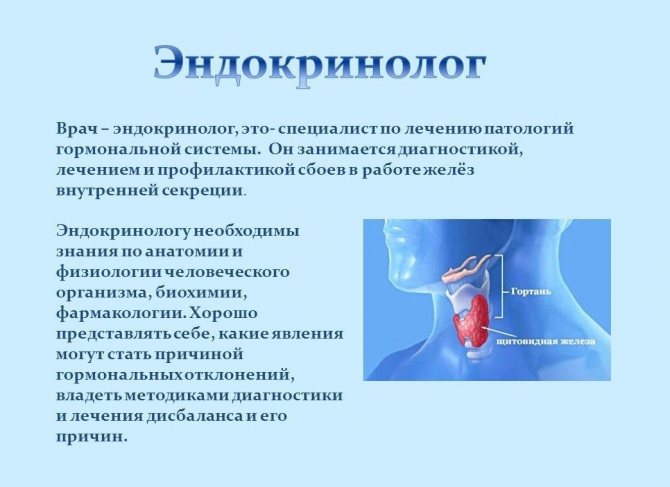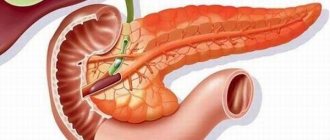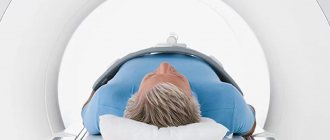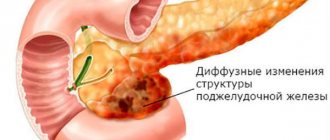A feeling of heaviness in the left side, especially evident after eating, girdle pain in the abdominal cavity, bloating and an unpleasant feeling of nausea - all these symptoms may indicate the presence of an inflammatory process in the pancreas.
This organ plays an important role in the digestive system, and if for any reason its activity is impaired, the health of the entire body deteriorates.
Not every person knows for sure the exact location of the pancreas and, as a rule, learns about this important organ only when certain problems with its functionality are identified.
Painful symptoms require immediate treatment, and then the question arises - which doctor treats the pancreas? In our article we will talk in detail about the features of treating the pancreas and about the specialists who treat this important digestive organ.
The role of the pancreas in the digestive system
The name “pancreas” characterizes the exact location of the organ - under the stomach, on the left side. If you experience any problems related to the digestive system, you should contact a gastroenterologist.
To get an appointment with this specialist, the patient must undergo a mandatory examination by a local therapist, who, in turn, based on the patient’s characteristic complaints, issues a referral to be examined by a gastroenterologist.
The pancreas plays the role of external secretion. It synthesizes pancreatic juice necessary for high-quality digestion of food, and also regulates the metabolism of proteins, carbohydrates and fats, producing a number of necessary hormones for this purpose.
With normal functionality, the pancreas produces up to one liter of pancreatic juice daily, as well as a number of important enzymes that promote the absorption of fats, the breakdown of carbohydrates and the digestion of protein foods.
Another function of the pancreas is the production of the hormones insulin, as well as glucogen, which protects the liver from fatty degeneration. If certain changes in the level of secreted hormones are detected, the patient will need the help of an endocrinologist.
Why go to an endocrinologist?
Everyone should understand that the gland produces hormones, such as glucagon, insulin, and somatostatin, which affect the metabolism of glucose in human blood.

For a more complete clinical picture, the patient is referred for examination to an endocrinologist.
At the moment when the gland becomes inflamed, problems with hormone metabolism may arise. Therefore, diabetes mellitus often develops additionally.
In order to prevent the disorder, it is necessary to consult an endocrinologist who will prescribe the correct hormone replacement therapy. If diabetes mellitus cannot be avoided, the doctor prescribes the required dose of insulin to alleviate the patient’s condition.
Causes and symptoms of diseases

The most common pancreatic disease is pancreatitis, an inflammatory process that provokes degeneration of organ tissue. The disease can occur suddenly and occur in an acute form, as well as in a chronic form, characterized by periodic manifestations. The main reasons for the development of the inflammatory process in the pancreas:
- eating junk food;
- non-compliance with diet;
- alcohol abuse;
- complications after infectious diseases;
- long-term use of strong medications;
- the presence of other diseases in the digestive organs;
- abdominal trauma.
Diseases of the pancreas are accompanied by characteristic symptoms: paroxysmal or aching pain in the left hypochondrium, a feeling of nausea, sometimes vomiting, bloating, increased gas formation, as well as the occurrence of diarrhea or frequent constipation. The patient loses his appetite, loses body weight, experiences vitamin deficiency, dry skin and brittle nails.
In acute pancreatitis, sudden attacks of pain occur, sometimes of a girdling nature. This development of the disease is often accompanied by vomiting. The chronic process manifests itself only during the period of exacerbation.
In addition to pancreatitis, other diseases of the pancreas may occur: necrosis, diabetes, and the formation of stones in the excretory ducts is also possible. With the development of necrosis, the patient's body temperature rises, frequent vomiting, diarrhea, and severe pain in the navel area are observed.
When the first symptoms appear, you should urgently seek help from a gastroenterologist. If an acute attack suddenly occurs, accompanied by painful symptoms, you must call an ambulance.
Acute pancreatitis requires surgical treatment, so the patient is sent to the inpatient gastroenterology department. In severe cases, hospitalization in a surgical or intensive care unit is possible.
Oncologist and pancreatitis
Many patients, as soon as they see the name of the doctor in the direction, begin to panic. An initial consultation with an oncologist is scheduled in order to detect problems in time.
After all, pancreatitis, especially if medical care is not provided in a timely manner, can lead to tumor diseases.
Recommendations from Elena Malysheva in the special issue “Live Healthy!” on how to overcome pacreatitis using the healing effects of natural remedies.
In order to identify problems, the oncologist prescribes instrumental diagnostics, in particular: computed tomography, magnetic resonance imaging or ultrasound examination.
Now you know which doctors treat acute and chronic pancreatitis. Remember, as soon as the first signs of the disease appear, you must immediately consult a doctor, this will help to quickly identify the causes of the disease and prescribe the necessary treatment.
Also read: Acute pancreatitis: symptoms and treatment at home
Diagnosis and treatment

To establish an accurate diagnosis, a comprehensive examination procedure is carried out. The patient must undergo a clinical and biochemical analysis of blood, urine, coprogram, ultrasound diagnostics of the abdominal cavity, angiography of the pancreas, as well as retrograde cholecystopancreatography.
In some cases, MRI, CT and ECG are performed. Diagnostic measures are prescribed individually, which depends on the patient’s personal symptoms. The condition of the pancreas during the development of acute pancreatitis is coordinated by a gastroenterologist, endocrinologist, and in case of complications, by an oncologist.
When indications for surgical intervention are identified, the patient is observed by a surgeon specializing in gastroenterology. During a chronic process accompanied by minor symptoms, the patient can be observed by a local therapist.
To avoid serious consequences that arise from ignoring treatment of pancreatic diseases, it is necessary to seek qualified help from specialized specialists when the first symptoms occur. Paying attention to your own health will have a positive impact on your general condition and throughout your life.
Who treats pancreatitis?
Often patients are faced with the fact that they do not know who is treating pancreatitis, so they waste precious time. So, which doctor treats the pancreas? There are many specialists, the main thing is to understand who and when to contact.

If you go to a medical facility in a timely manner, during a preliminary examination the therapist will more accurately tell the patient which doctor to go to with pancreatitis.
Doctors:
- Therapist.
- Gastroenterologist.
- Endocrinologist and surgeon.
- Oncologist.
What is the name of the doctor who treats the liver - hepatologist. The patient is referred to this specialist if there are pathological complications.
The disease occurs in several stages, each of which is treated in different departments.

The human pancreas is an elongated lobular formation of a grayish-pinkish hue and is located in the abdominal cavity behind the stomach, closely adjacent to the duodenum.
Main departments for the treatment of pancreatitis:
- Gastroenterological.
- Surgical intensive care unit.
- Advanced disease is treated in the oncology department.
In addition, the disease can be treated by a therapist directly at a day hospital.
What else to read:
- How to eat with pancreatitis and inflammation of the pancreas? Pancreatitis is a disease of the pancreas, it is inflammatory in nature and appears along with the onset of diseases of the liver, gallbladder, poor diet and consumption of large amounts of alcohol….
- Causes of the development of pancreatitis in childhood The inflammatory process occurring in the ducts and tissues of the pancreas, caused by increased enzyme activity, is called pancreatitis in medical practice. This disease occurs not only in adults, but also...
- Herbal infusions and preparations for pancreatitis and cholecystitis The pancreas and gall bladder react sharply to junk food and alcohol, so any compromised factor can lead to the development of unpleasant diseases - pancreatitis and cholecystitis. These diseases are very...
Which doctor treats the liver?
The liver is the largest gland that filters the blood, cleansing the body of toxic substances. This vital organ is involved in the digestion process, synthesizes bile, cholic acids, and bilirubin. The liver creates the necessary reserves of energy, vitamins and minerals “for a rainy day.” Iron neutralizes toxic substances, waste, etc.
Under the influence of negative factors, the functionality of the organ is impaired. This has a bad effect on the functioning of the entire body. Therefore, if characteristic symptoms appear, you should consult a doctor. Then the patient has a question about which doctor treats the liver. This will be discussed in more detail below.
As mentioned earlier, the liver is a vital organ that performs about 500 functions. Therefore, despite all the achievements of medicine, it has still not been possible to artificially reproduce its work.
Doctors identify the most dangerous liver diseases:
- toxic or infectious hepatitis;
- steatosis (fatty hepatosis);
- cirrhosis, which provokes liver cancer.
If a person’s condition worsens, heaviness is felt in the right hypochondrium or the liver hurts, then it is necessary to consult a specialist. It is strongly not recommended to ignore the problem, since diseases of the organ can have serious consequences.
You should seek medical help if the following symptoms occur:
- pressure or heaviness on the right side under the ribs;
- bitterness in the mouth (especially in the morning);
- burning behind the sternum, loss of appetite, nausea;
- darkening of urine and discoloration of stool;
- the skin and whites of the eyes turn yellow;
- irritability increases, the patient quickly gets tired of normal activities;
- bowel disorders (diarrhea or constipation);
- allergy attacks, itching of the skin;
- visual impairment;
- acne or boils on the body;
- a sharp increase in pressure.
Often the patient consults a doctor late, when the clinical picture is already pronounced, the functioning of the gland is disrupted, and its tissues have suffered irreversible damage. The areas where connective tissue has grown are unable to function normally, and as a result, the condition of the entire body deteriorates. The treatment method for liver pathologies differs, depending on how damaged the organ is. As a rule, the main goal of therapy is to stop the progression of the disease.
When characteristic symptoms occur, patients wonder which doctor to see. Treatment of the gland is carried out by different specialists, depending on the course of the pathological process.
Treatment tactics
An attack of pancreatitis is an indication for hospitalization. In some cases, chronic recurrent pancreatitis, or mild pancreatitis, can be treated at home. In such cases, the pancreas is treated by a general practitioner on an outpatient basis. An already developed episode of pancreatitis suggests irreversible changes in the parenchyma of the organ. Therefore, the success of treating a disease directly depends on the cause and form of its manifestation.
Pancreatitis in the acute stage involves eliminating food intake and switching to fasting. In some cases, it is necessary to install a gastric tube for continuous aspiration of its contents. These measures allow you to relieve the pancreas and reduce the number of aggressive enzymes. You can also administer medications using a probe. The need to place a tube requires the intervention of a surgeon, so he can also treat pancreatitis.
Pancreatitis requires a special drinking regime. It is allowed to drink alkaline mineral water without gas, as it does not irritate the gastrointestinal tract. Cold is applied to the epigastric area, which reduces the secretory activity of the pancreas.

Also, painkillers, anti-enzyme and antispasmodics must be used in the complex of therapy. Prescribed drugs from the group of H2 blockers - Ranitidine, Famotidine. If vomiting occurs, it is recommended to take Cerucal. From the group of antienzyme drugs, Trasylol and Contrikal are used.
At the stage of remission and during chronic course, compliance with dietary recommendations plays a key role. Pancreatitis requires a sharp restriction of the amount of carbohydrates and fats in the diet. Small meals, 5-6 times a day. Alcohol is strictly contraindicated. An adequate dose of the enzyme preparation is selected for each meal. This group includes: Creon, Mezim, Pancreatin, Pancreazim, etc. The use of enzymes allows you to create rest for the pancreas and provides conditions for the restoration of secretory cells.
Pancreatitis is difficult to treat, so at the first symptoms of the disease it is recommended to seek qualified medical help. This will avoid serious complications of the disease. Self-medication or refusal of therapy can cause organ dysfunction and lead to surgery.
Author : Nikulina Natalya Viktorovna, especially for the site Zhkt.ru











